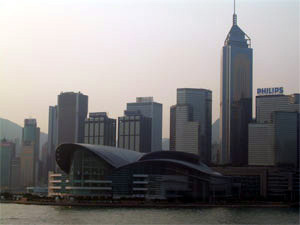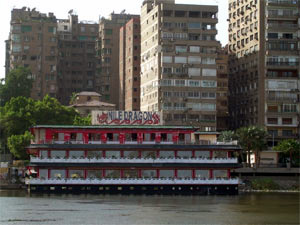Semester at
Sea Fall
2006 Voyage 
TABLE
OF CONTENTS
- Sarah's Home Page
- My bio!
- The
Costly
Implications of Globalization: Beijing & Cairo
- The Pressures of Global China
- The Transnationalization of
Vietnam
- Horizontal & Vertical
Tensions in Myanmar
- India: Discovering Varanasi
- Turkey: Transnational vs
Vernacular in Istanbul
- Contrasts of Modern Day Egypt
- Open Letter
My comparative global cities project
focuses in the underside of economic globalization. Public attention is
commonly focused on the glamour of global cities and the destruction
that is created goes unnoticed. This paper examines the
Westernization of cultures that experience globalization. Enjoy!
The
Costly
Implications of Globalization: Beijing and Cairo


By Sarah Grimaldi
The Costly Implications of Globalization
Global cities are being formed in our world at a
record pace. The phenomenon of globalization has increased the movement
of people, goods, news, and services into urban centers around the
world. The centralization of multinational headquarters and specialized
service sectors are one of the main reasons these global cities are
created. Saskia Sassen states in her article, “Locating Cities on
Global Circuits”, that centralizing global economies allows
transnational corporations to successfully coordinate production,
investment, and finance on a global scale. As these transnational
corporations are fulfilling their dreams through these urban centers,
many dreams of the vernacular communities are in turn destroyed.
Families are forcefully moved from their homes and land prices become
far too inflated for the families that once lived there.
Globalizing a city involves countless changes to a city’s physical and social structures. A global city inherently creates pressures on any community that is caught in its path. As a city begins to modernize, the pressure between the vernacular neighborhoods and transnational territory is eye opening. Another characterization of a global city is westernizing ones culture to appeal to the transnational community. Throughout the numerous global cities I have encountered on this voyage, both Beijing and Cairo have especially illuminated these social, vernacular, and transnational, themes.
Click on the links below to review the research on which this essay about Beijing and Cairo is based:
Egypt
Analysis
One must not forget that a city’s “makeover” may have a beautiful and structured outward appearance, but it likely creates pressure and disarray for the vernacular community. Unfortunately the vernacular communities that are destroyed during a modernization process are hardly recognized. The impressive infrastructure and grand architecture can easily cause one to forget about the communities that once resided in their place. Timothy Mitchell accurately describes the colonizing of Egypt when he stated that, “The identity of the modern city is created by what it keeps out. Its modernity is something contingent upon the exclusion of its opposite.” Egyptian families were moved from Bulaq in the center of Cairo to housing projects on the outskirts of the city during the period of 1979-1981. The vernacular housing and their communities interfered with Sadat’s plan of transforming Cairo into a appealing and more Westernized city. The space was notably valuable at the time because his policies were rapidly inflating the prices of land. The land was unfortunately, and often is seen as more valuable than the actual people that resided there. This displacement of entire communities is a reoccurring theme that takes place in a global city which aims at modernizing its urban space.
The new surge of foreign investment and rapidly expanding sectors in global cities has undeniably created numerous opportunities and wealth for the transnational elites. The benefits of economic growth are told to us through the mass-media on a daily basis. Public attention is rarely focused on the underside of economic growth that has triggered these global cities. Structural changes within a globalizing city can directly hurt those who are on the lower end of the economic ladder. Fully commodified housing, massive glass buildings, and overpowering bridges seem to easily swallow the seemingly powerless vernacular neighborhoods.
The forces of politics and economics not only disrupt vernacular lifestyles, but also deter traditional cultures. Westernizing a global city innately involves creating a consumer culture that glorifies the “new” and rejects the traditional. The new and the old do not easily mix which rapidly divides communities. As direct foreign involvement becomes increasingly influential in Cairo and Beijing, the rich and continuous heritages of the Egyptian and Chinese people may be at stake. As an economics major I am constantly told the constructive attributes of a globalizing world. Economic growth, private investment, and the free flow of capital are the positives that I have studied about a globalized world. However, through my research and observations I have discovered that economic globalization can also create disturbing implications that are irreversible. The destruction of local safety nets, increasing income inequality, and the reconstruction of cultures around the world are all consequences of the globalization phenomenon. Globalization does contain some positive aspects, but it is also creating a destructive path that is leading towards a dark and unsolvable cultural and social crisis.
Globalizing a city involves countless changes to a city’s physical and social structures. A global city inherently creates pressures on any community that is caught in its path. As a city begins to modernize, the pressure between the vernacular neighborhoods and transnational territory is eye opening. Another characterization of a global city is westernizing ones culture to appeal to the transnational community. Throughout the numerous global cities I have encountered on this voyage, both Beijing and Cairo have especially illuminated these social, vernacular, and transnational, themes.
Click on the links below to review the research on which this essay about Beijing and Cairo is based:
The Pressures of Global China
The Contrasts of Modern DayAnalysis
One must not forget that a city’s “makeover” may have a beautiful and structured outward appearance, but it likely creates pressure and disarray for the vernacular community. Unfortunately the vernacular communities that are destroyed during a modernization process are hardly recognized. The impressive infrastructure and grand architecture can easily cause one to forget about the communities that once resided in their place. Timothy Mitchell accurately describes the colonizing of Egypt when he stated that, “The identity of the modern city is created by what it keeps out. Its modernity is something contingent upon the exclusion of its opposite.” Egyptian families were moved from Bulaq in the center of Cairo to housing projects on the outskirts of the city during the period of 1979-1981. The vernacular housing and their communities interfered with Sadat’s plan of transforming Cairo into a appealing and more Westernized city. The space was notably valuable at the time because his policies were rapidly inflating the prices of land. The land was unfortunately, and often is seen as more valuable than the actual people that resided there. This displacement of entire communities is a reoccurring theme that takes place in a global city which aims at modernizing its urban space.
The new surge of foreign investment and rapidly expanding sectors in global cities has undeniably created numerous opportunities and wealth for the transnational elites. The benefits of economic growth are told to us through the mass-media on a daily basis. Public attention is rarely focused on the underside of economic growth that has triggered these global cities. Structural changes within a globalizing city can directly hurt those who are on the lower end of the economic ladder. Fully commodified housing, massive glass buildings, and overpowering bridges seem to easily swallow the seemingly powerless vernacular neighborhoods.
The forces of politics and economics not only disrupt vernacular lifestyles, but also deter traditional cultures. Westernizing a global city innately involves creating a consumer culture that glorifies the “new” and rejects the traditional. The new and the old do not easily mix which rapidly divides communities. As direct foreign involvement becomes increasingly influential in Cairo and Beijing, the rich and continuous heritages of the Egyptian and Chinese people may be at stake. As an economics major I am constantly told the constructive attributes of a globalizing world. Economic growth, private investment, and the free flow of capital are the positives that I have studied about a globalized world. However, through my research and observations I have discovered that economic globalization can also create disturbing implications that are irreversible. The destruction of local safety nets, increasing income inequality, and the reconstruction of cultures around the world are all consequences of the globalization phenomenon. Globalization does contain some positive aspects, but it is also creating a destructive path that is leading towards a dark and unsolvable cultural and social crisis.